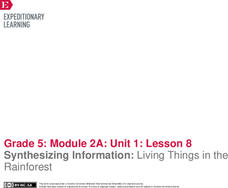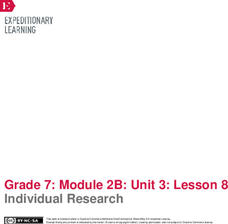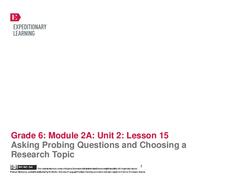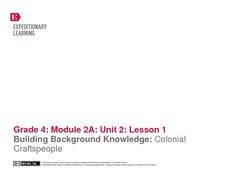EngageNY
Taking Notes and Citing Quotes from Text: Gathering Information on our Rainforest Insects
In other words. Scholars practice using paraphrasing and quotes. They partner in pairs to write a paraphrase for an information text strip. Individuals then use their skills to paraphrase information from the text Fire Ants.
Teach Engineering
An Introduction to Air Quality Research
Viewers are a PowerPoint are exposed to the idea that pollutants are in more than just the air we breathe. the presentation provides information about the layers of the earth's atmosphere and takes a look at the pollutants in the...
Curated OER
Researching African Americans Who Made a Difference
Celebrate Black History Month with this instructional activity, in which middle schoolers create an essay about a famous African-American. Writers conduct research online, take notes to write an essay in proper format, and use ideas,...
EngageNY
Synthesizing Information: Living Things in the Rainforest
How is a map a type of informational text? Class members view a world map of major rainforests, discussing its text features with a partner. Next, they take notes on key details from multiple texts about rainforests and write an...
EngageNY
Documenting Research: Sorting and Recording Information About the Wheelwright
Fourth graders practice using a graphic organizer to record their notes and answer text-dependent questions while supplying evidence of how they found their answer. They focus on a machine called the wheelright, which was commonly used...
EngageNY
Researching about the Red Cross, Continued: Who Is the Red Cross and What Does This Multinational Organization Do?
Code red! Learners read an informational article about the Red Cross, discussing the gist of the text in small groups. On a three-column note catcher, pupils take notes to show how the Red Cross functions as a multinational aid...
EngageNY
Individual Research
Class members choose an ad they want to analyze for their performance task. They then read specific text based on the ad they chose. The instructor guides learners through a Model Research Synthesis document in which they try to...
EngageNY
Asking Probing Questions and Choosing a Research Topic
Begin the writing journey of an evidence-based essay detailing a rule to live by with various activities to familiarize learners with the topic and jump-start brainstorming. First, pupils take part in an in-depth review and discussion of...
EngageNY
Introducing New Athletes to Research: Althea Gibson and Roberto Clemente
Let's take a walk! Scholars participate in a gallery walk to view images and text about athletes Althea Gibson and Roberto Clemente. After summarizing the information they've learned, pupils choose which athlete they are interested in...
Curated OER
Research Skills: Information Retrieval and Evaluation
Focus on research skills, specifically identifying key words and concepts on a specific topic and evaluating information for relevance and authority. This is part of a multi-step lesson on Ancient Rome; however, it is useful for any...
EngageNY
Researching about the Red Cross: What Is a Multinational Aid Organization?
Lend a helping hand. Pupils read two informational articles about international aid organizations and how they help areas affected by natural disasters. Scholars attempt to uncover the gist of each text, discussing their thoughts in...
EngageNY
Presenting a Research-Based Claim: Effective Speaking Techniques
Take note. Scholars receive their claim drafts back to revise and write their claims and three pieces of evidence on notecards. They save the notecards to use when the verbally present their claims to the class. At the end, individuals...
PBS
The Sixties: Notes from the Ho Chi Minh Trail
Young historians research the rationales for fighting the Vietnam War, and the controversies surrounding it. They watch film clips, examine photographs, and read Lyndon B. Johnson's message to Congress to gather information for a...
EngageNY
End of Unit 2 Assessment: Working with Two Texts - Reading, Listening, Summarizing, and Synthesizing
As a summative assessment for this unit on colonial trade, fourth graders listen to and read informational texts in order to demonstrate their ability to take notes, write summaries, and draw connections. Young scholars first listen as...
Curated OER
Researching the Past
Learners research the western movement in order to learn note taking strategies with nonfiction texts. They use the Internet to search for important information about the western movement using the Cornell Notes note-taking system. They...
EngageNY
Conducting Research: Asking and Answering our Questions about Rainforest Arthropods
Let's ask an expert. Scholars divide into groups to research and become experts on either ants or butterflies. Learners use task cards and text on their topic to complete a note catcher. At the end, they share their information with a...
EngageNY
Structuring The Search: Categorizing Our Research
What can you contribute? Scholars read text to determine how ants contribute to the rainforest. First, they categorize and sort facts gathered from reading. Next, readers focus on specific terms in each paragraphs of the text Ants by...
EngageNY
Conducting Research: Analyzing a Variety of Sources to Capture Information about My Insect
From picture to words. Scholars analyze a picture of an ant and then list two facts they observed and any questions that may arise. Expert groups from the previous instructional activity then look at a diagram about either an ant or...
The New York Times
Collateral Damage? Researching a Connection Between Video Games and Violence
Hook your class into an exploration of and discussion about violence in video games with a cute animal clip and a video game trailer. After a quick discussion about how media can affect mood, class members read a related article and...
Museum of Disability
Taking Visual Impairment to School
What is the world like when you can't see, or when your vision is impaired? Learn about how Lisa communicates with the world around her with Taking Visual Impairment to School by Rita Whitman Steingold. Learners answer discussion...
EngageNY
Mid-Unit 3 Assessment, Part II: Organizing Notes for a Public Speech
It's all a matter of opinion! Pupils take Part II of the mid-unit assessment, in which they continue organizing their notes in preparation for writing an opinion speech. Using the resource, they add reasons, evidence, and a concluding...
EngageNY
Applying Research Skills: “Rachel Carson: Environmentalist and Writer”
It's important to cite sources! Scholars take a closer look at their research about DDT by examining how to cite sources. Learners take turns sharing information that would be used to cite sources to complement Rachel Carson:...
EngageNY
Building Background Knowledge: Colonial Craftspeople
In the first lesson plan of this unit on colonial trade, fourth graders gain background knowledge of different jobs performed by early colonists. The class begins with a slide show presentation that includes a variety of great...
Curated OER
Lesson: Snake Handling
Are the studies of art and archeology connected? You bet they are! Young scholars research the ancient temples of Mexico by visiting an archaeology site. They describe the various temples they see, taking note of shapes, stairs, details,...

























